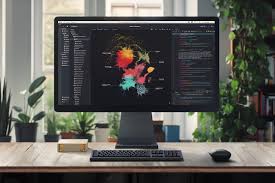Latest Trends in Computer Technology
The world of computer technology is ever-evolving, with new innovations and advancements emerging at a rapid pace. From groundbreaking hardware developments to revolutionary software updates, staying informed about the latest trends is essential for tech enthusiasts and professionals alike.
Quantum Computing: The Future of Processing Power
Quantum computing has been a buzzword in the tech industry for several years, but recent advancements have brought it closer to practical application. Unlike traditional computers that use bits as the smallest unit of data, quantum computers use qubits, allowing them to perform complex calculations at unprecedented speeds. Companies like IBM and Google are leading the charge, with significant breakthroughs that promise to revolutionise fields such as cryptography, artificial intelligence, and materials science.
Artificial Intelligence: Transforming Industries
Artificial Intelligence (AI) continues to be at the forefront of technological innovation. With machine learning algorithms becoming more sophisticated, AI is transforming industries ranging from healthcare to finance. Recent developments include improved natural language processing capabilities and enhanced predictive analytics tools, enabling businesses to make data-driven decisions with greater accuracy.
5G Connectivity: A New Era of Mobile Internet
The rollout of 5G networks is set to change how we connect and communicate. Offering significantly faster download speeds and lower latency than its predecessors, 5G technology will enable seamless streaming of high-definition content and support the growing Internet of Things (IoT) ecosystem. As more cities around the world adopt this technology, consumers can expect a more connected digital experience.
Cybersecurity: Protecting Digital Assets
As digital transformation accelerates across all sectors, cybersecurity has become more critical than ever. Recent news highlights an increase in cyber threats such as ransomware attacks and data breaches. In response, companies are investing heavily in advanced security measures like multi-factor authentication and zero-trust architectures to safeguard their digital assets.
Sustainable Technology: A Greener Future
Sustainability is becoming a key focus within the tech industry as companies aim to reduce their environmental impact. Innovations such as energy-efficient processors and eco-friendly data centres are gaining traction. Moreover, tech giants are committing to carbon-neutral goals by investing in renewable energy sources and sustainable manufacturing practices.
Conclusion
The landscape of computer technology is dynamic and full of exciting possibilities. Staying abreast of these trends not only helps individuals remain competitive but also opens up new opportunities for innovation across various sectors. As we move forward into this new era of technology, embracing these changes will be crucial for harnessing their full potential.
Exploring the Future: Key Questions on Advancements and Challenges in Computer Technology
- What are the latest advancements in computer technology?
- How is artificial intelligence shaping the future of technology?
- What impact will 5G connectivity have on digital communication?
- How can businesses protect themselves from cyber threats in the digital age?
- What are some sustainable practices being adopted in the tech industry?
What are the latest advancements in computer technology?
The latest advancements in computer technology encompass a range of exciting developments that are reshaping the industry. Quantum computing is making significant strides, promising to revolutionise processing power with its ability to perform complex calculations at unprecedented speeds. Artificial Intelligence continues to advance, with improvements in machine learning algorithms and natural language processing transforming industries such as healthcare and finance. The rollout of 5G networks is enhancing connectivity, offering faster download speeds and supporting the growing Internet of Things (IoT) ecosystem. Cybersecurity measures are also evolving, with companies adopting advanced strategies like multi-factor authentication and zero-trust architectures to protect digital assets. Additionally, there is a growing emphasis on sustainable technology, with innovations aimed at reducing environmental impact through energy-efficient processors and eco-friendly data centres. These advancements highlight the dynamic nature of computer technology and its potential to drive further innovation across various fields.
How is artificial intelligence shaping the future of technology?
Artificial intelligence (AI) is significantly shaping the future of technology by driving innovation and transforming various industries. AI technologies, such as machine learning and natural language processing, are enabling computers to perform tasks that traditionally required human intelligence. In healthcare, AI is improving diagnostic accuracy and personalising treatment plans. In finance, it enhances fraud detection and automates trading strategies. The automotive industry is witnessing advancements in autonomous vehicles powered by AI, while in retail, AI-driven analytics are revolutionising customer experiences through personalised recommendations. As AI continues to evolve, it is expected to lead to more efficient processes, new business models, and unprecedented levels of automation across sectors, fundamentally altering how we interact with technology in our daily lives.
What impact will 5G connectivity have on digital communication?
The advent of 5G connectivity is poised to revolutionise digital communication in significant ways. With its unparalleled speed and low latency, 5G technology will enable faster and more reliable data transmission, paving the way for seamless streaming, high-quality video calls, and enhanced user experiences across various devices. The increased bandwidth offered by 5G networks will support the growing demand for IoT devices and services, fostering a more connected and efficient digital ecosystem. Moreover, 5G connectivity has the potential to drive innovation in areas such as augmented reality (AR) and virtual reality (VR), opening up new possibilities for immersive communication experiences. Overall, the impact of 5G on digital communication is expected to be transformative, shaping the way we interact and communicate in the digital age.
How can businesses protect themselves from cyber threats in the digital age?
In the digital age, businesses face an increasing number of cyber threats that can compromise their sensitive data and operations. To protect themselves effectively, businesses must implement robust cybersecurity measures. This includes investing in reliable antivirus software, conducting regular security audits, and educating employees on best practices for online safety. Additionally, implementing multi-factor authentication, encrypting sensitive information, and regularly updating software patches are essential steps in fortifying a company’s digital defences. By staying vigilant, proactive, and continuously adapting to the evolving threat landscape, businesses can significantly reduce their vulnerability to cyber attacks and safeguard their valuable assets in the digital realm.
What are some sustainable practices being adopted in the tech industry?
In response to the growing concern for environmental sustainability, the tech industry has been adopting various practices to reduce its ecological footprint. One key sustainable practice is the shift towards energy-efficient technologies, such as the development of low-power processors and data centres that utilise renewable energy sources. Additionally, companies are implementing recycling programs for electronic waste and promoting responsible product lifecycle management to minimise environmental impact. Embracing sustainable practices not only benefits the planet but also showcases a commitment to corporate social responsibility within the tech sector.




